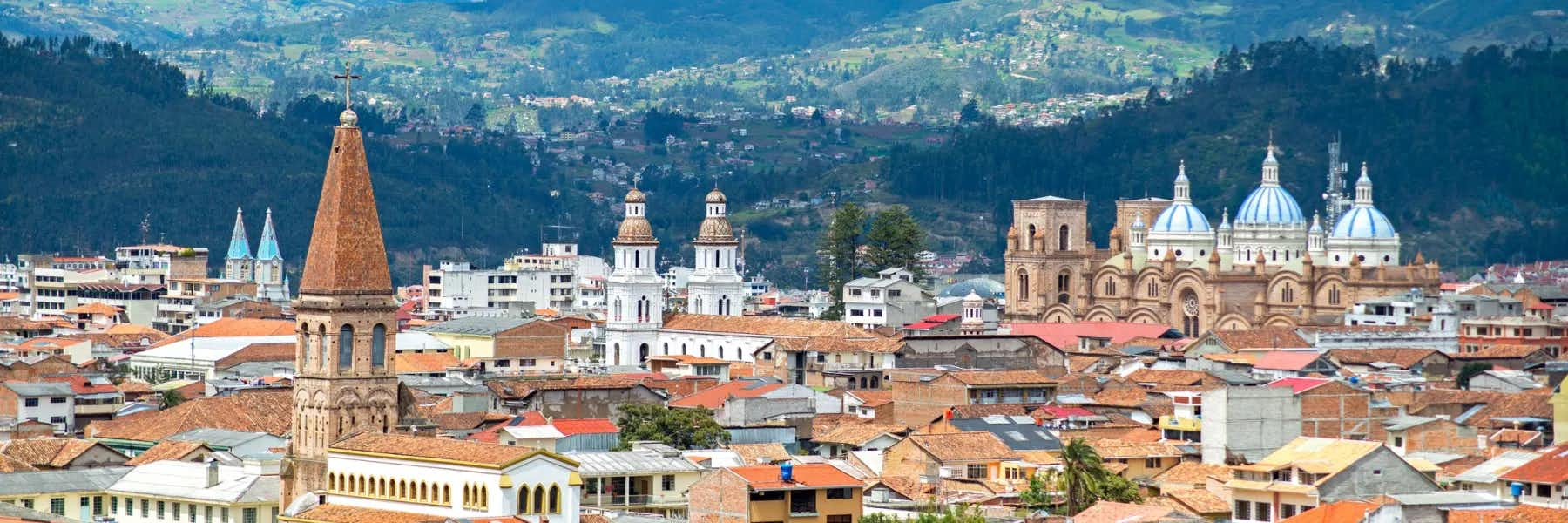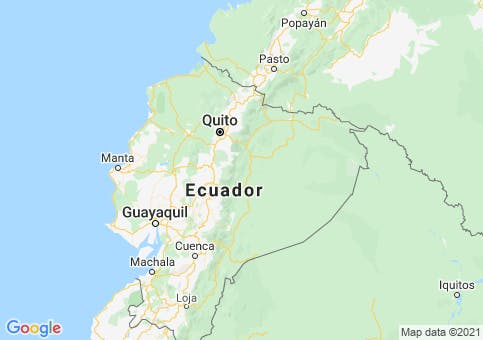Ecuador is a truly unique country, and although it has only recently shown up on many people’s radars, moving to Ecuador should be a definite consideration if you are thinking about moving overseas. In Ecuador, you can find inexpensive but high-quality real estate and a good quality of life.
In Ecuador you can have a driver, a cook, or a maid for a fraction of the cost you’d pay back home. You can eat a gourmet meal in world-class restaurants of every cuisine at prices unheard of in Los Angeles, New York City, or London. Or you can cook for yourself using market-fresh fruits and vegetables only seen in specialty shops in North America.
Moving to Ecuador also keeps you relatively close to friends and family back home. Daily flights connect Ecuador to major hubs throughout the hemisphere, and the flight to Miami is less than four hours. Cell phones and internet cafés are everywhere in Ecuador, and high-speed home internet hookups are quite common.
Also consider the fact that Ecuador has one of the lowest serious crime rates in Latin America and a higher standard of living than most Central American and surrounding Andean nations. The reasons to consider Ecuador tend to grow on you.
Who Is Moving to Ecuador?
Foreigners are drawn to moving to Ecuador for a variety of reasons. If you move to Ecuador, you will find an expat community of entrepreneurs, travelers, advisors, foreign officials, diplomats, businessmen of all stripes, and, of course, retirees looking to stretch their money and experience a different way of life.
Generally speaking, the expats who have moved to Ecuador are those who tend to blend into the society rather than live together in non-integrated, expat-oriented communities.
Nonetheless, a bit of time in any town of significant size in Ecuador is all it takes to find the haunts and watering holes of the non-natives. The expat community is probably equally mixed between people who are conducting some sort of business and those who have retired in Ecuador. And though many are near or at retirement age, many younger folks and families are making the move to Ecuador, too.
How to Move to Ecuador
There are a number of ways to become an Ecuadorian resident, and the process is fairly straightforward. You submit your immigrant-status visa application at the Ecuadorian consulate nearest your former residence, but it is approved through the Ministry of Foreign Relations, so expect the approval process to take four to eight weeks. Visa applications for your dependents, however, can be processed directly by the consulate once your application has been approved.
There are many different options for obtaining a residence visa, but the most common types of visas are the 9-I Pensioner’s visa and the 9-II Investor’s visa.
To qualify for a pensioner’s visa you must show that you receive an income of at least $800 per month from a qualifying source such as Social Security or a pension. You’ll need an additional $100 per month for each dependent who also wishes to receive a visa.
You can also choose to receive a visa by investing in the country. The most common ways of doing so are by depositing money into a bank CD or by purchasing property. The assessed value of the property or funds in a CD must equal $25,000 for the primary applicant plus $500 for each dependent.
For more information on types of visas and how to secure one visit: Ecuador Visa and Residence Information.
16 Things I Wish I’d Known Before Moving to Ecuador
By Donna Stiteler
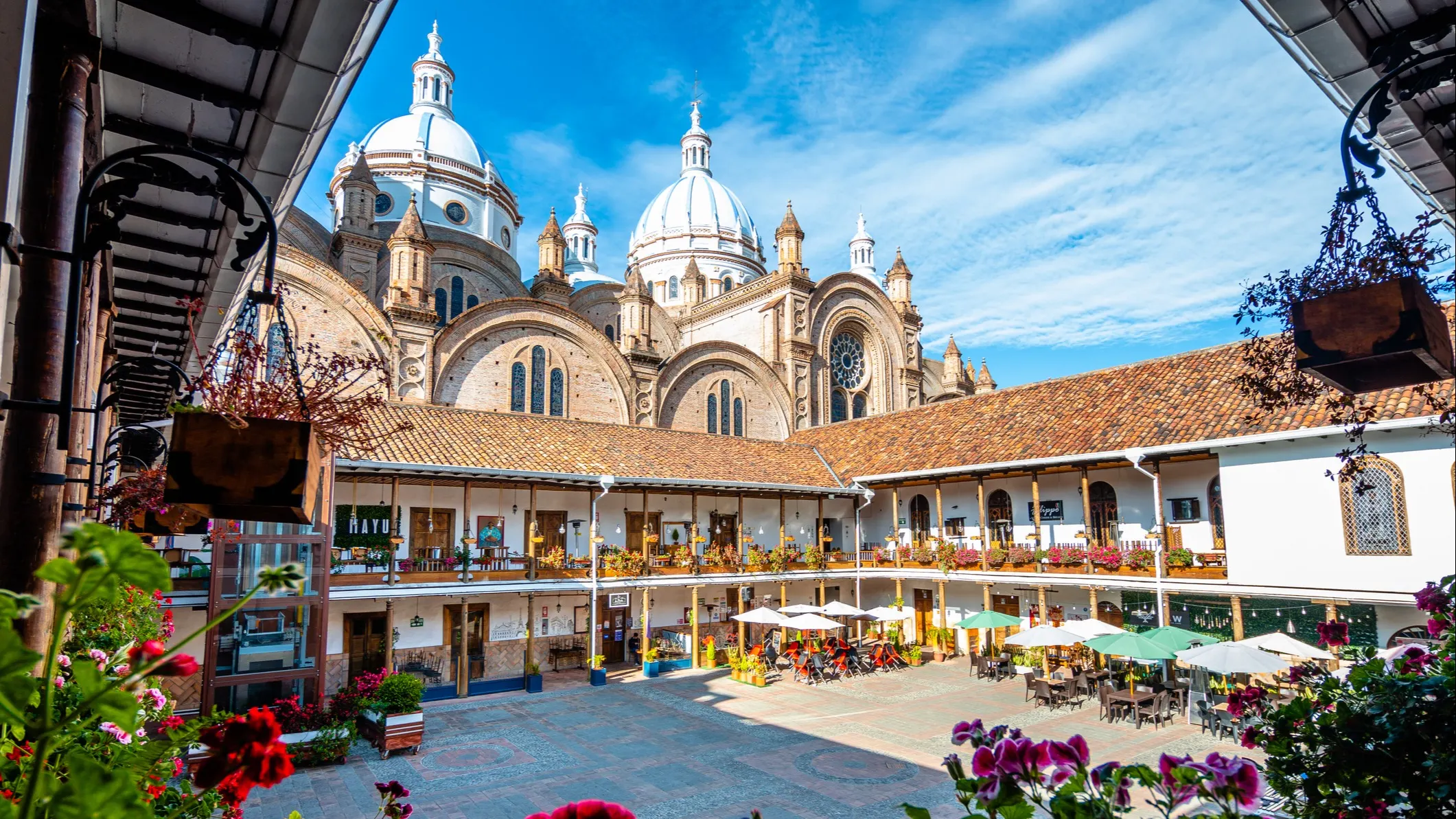
I wish that as soon as I had stepped off the plane in Cuenca, Ecuador, that someone would have handed me a PDF of things I should know immediately. I was discussing this with my friends at lunch when they started espousing their thoughts…
Pat: “I wish someone would have told me that those beautiful marble sidewalks in the historic district were like a slip and slide when it rains.”
Bonnie: “How about that pedestrians do not have right of way, even at crosswalks? And be aware of the-foot-tall bollard posts that keep cars from crossing onto the sidewalks. They are tripping hazards. People get knocked down by them like they’re bowling pins. Keep your eyes glued downward, not up at the beautiful architecture dare you trip.”
Sandy: “Never leave the house without raingear, an umbrella, or rain jacket. It can be sunny and then 15 minutes later raining. I use my umbrella for shade from the sun more than anything.” (Sandy has skin the color of the mimes who perform on street corners.)
Stefani: “That you can use your ATM and get American dollars (the currency of Ecuador) easily. Twenties shoot out of them like they’re slot machines.”
Sharon: “Wash all your vegetables in vinegar for 15 minutes before eating them. The veggies come right out of the ground in the tiendas and the natural fertilizers (yep, animals help) have to be washed off.”
Cuenca is a UNESCO World Heritage site, the third largest city in Ecuador, and a popular expat and tourist spot. It’s a modern Andean city with an urban population of 450,000, and is known for its Spanish colonial and French republican architecture, and plethora of outdoor cafés and trendy bars.
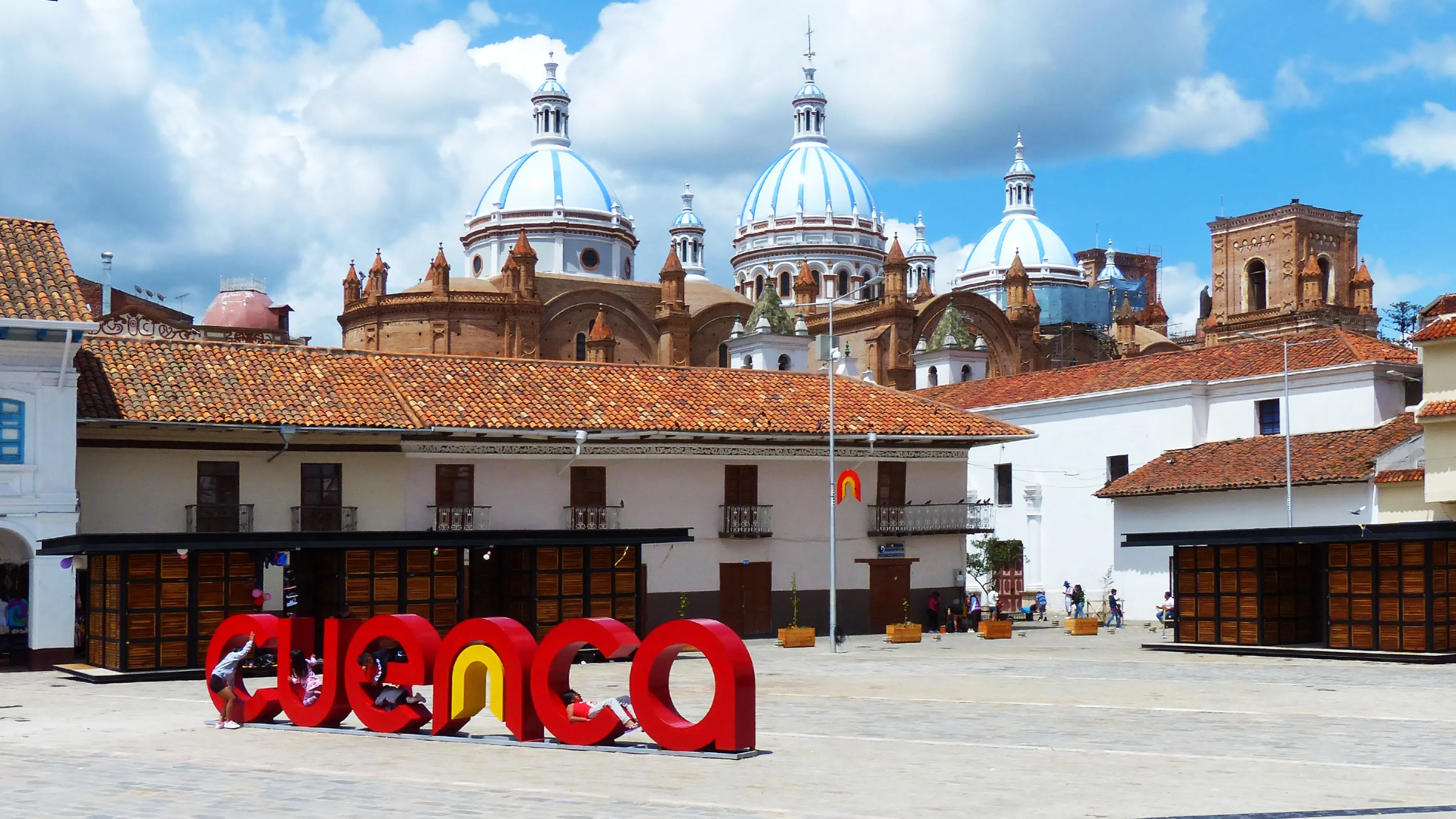
As the cultural capital of Ecuador, music, artwork, street performers, native fiestas, and holiday celebrations give near-endless reasons to visit or move here. It offers near-perfect spring- and fall-like weather year-round and a cost of living so low it’s easy to live off your social security. You can choose to live on the beach, in the Andes Mountains, or in Amazon rain forests. Ecuador is known for its diversity.
Yet Ecuador is a developing country so to make sure you can acclimate to its culture, I gathered up some things you should know before getting off the plane…
Get Your Free Ecuador Report Here
Get Your Free Ecuador Report Here
Learn more about Ecuador and other countries in our daily postcard e-letter. Simply enter your email address below and we'll send you a FREE REPORT - Ecuador: Live Like Royalty on Your Social Security.

By submitting your email address, you will receive a free subscription to IL Postcards and special offers from International Living and our affiliates. You can unsubscribe at any time, and we encourage you to read more about our Privacy Policy.
1. It’s Groundhog Day
Here in Cuenca, the sun comes up at 6:30 a.m. and sets at 6:30 p.m. You scramble in the mornings to do your errands and tuck in early. A typical day sees you get up with the sun and savor your coffee as you realize you don’t have to do nothin’ if you don’t want to. But by 10 a.m. you’re itching to get out, so you’ll start running errands early before it clouds up.
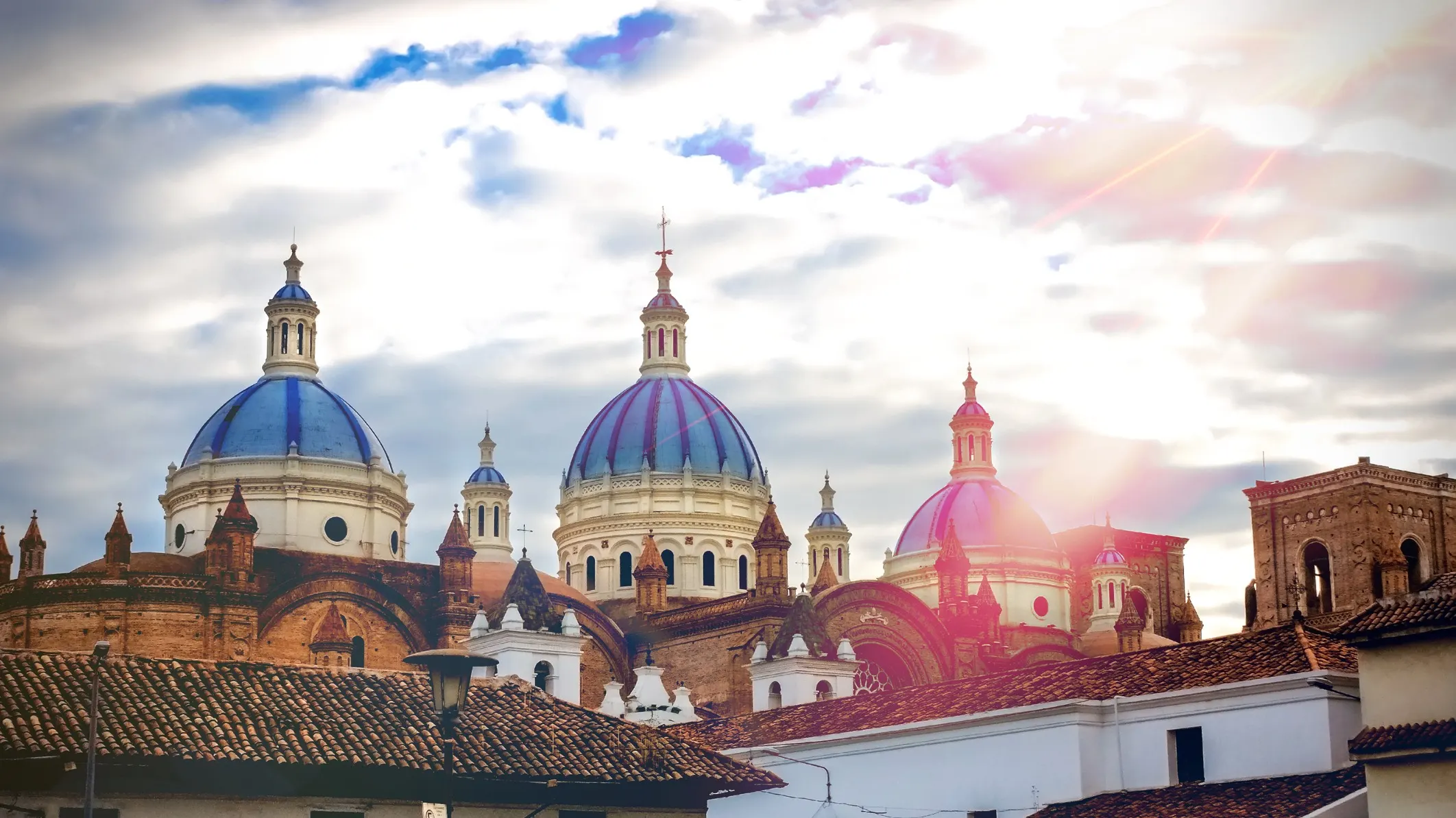
Lunch is for meeting friends or sitting at an outdoor café drinking craft beers. Afternoons are for pickleball, bike riding, hiking, or playing cards. Around sunset expats head back home to cook up organic meals, or prepare to dine out with friends, or maybe go the symphony.
2. Never Ask a Local for Directions
Never, and I will repeat this, NEVER ask a local for directions. It’s not uncommon in a developing country to not have street addresses, so locals will look at you quizzed beyond belief when you mention a street name. Usually, directions here are more like, “turn left where the three cows are grazing on the corner, go a few blocks until you see the woman selling fruit off the wheelbarrow, and it’s near there.”
Of course, giving wrong directions by Ecuadorians is not malicious. They just really want to feel they’ve helped you, even when they are sending you in the exact opposite way you intended to go.
3. Taxi Tips
Taxis are cheap and plentiful here in Cuenca. A few dollars will get you anywhere in town. But flagging a taxi is different in Ecuador. You don’t wave them down like you’re trying to land an airplane. It’s more of an outstretched hand at waist level where you flash your fingers like you flicking a cigarette butt.
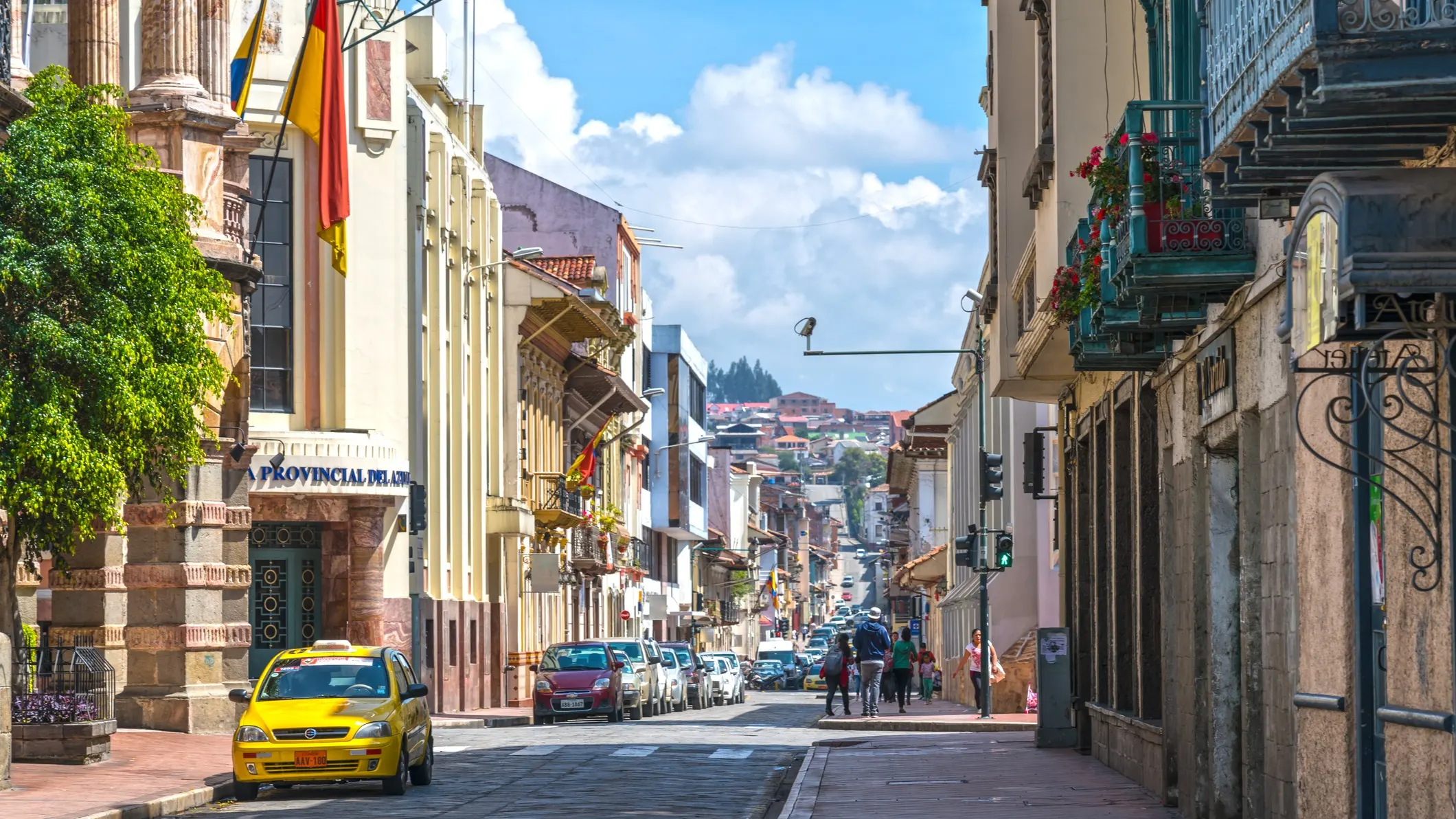
Taxis will usually flash their headlights if they are stopping for you. If it’s raining, all deals may be off as the taxis fill up fast. Rains don’t last long, so grab a coffee until the rain stops and the taxis reappear.
4. The Meaning of “Mañana”
In no way does “manaña” mean “tomorrow”. It just means “not today”. So, if you’ve scheduled that plumber to fix your calefon (which heats your hot water) and he says “manaña”, it just means somewhere in the future. If they do give a time, like at 2 p.m., you’re never sure what day the 2 p.m. occurs.
Ecuadorians are getting better about nailing down timeframes as the time-obsessed U.S. culture creeps in, but there’s never a rush here. Tranquillo por favor. Getting mad and yelling about missed deadlines isn’t a good look.
Time is irrelevant in Ecuador. If something better comes up, like your son’s soccer tournament, then vendors will stick a note on the door saying they’ll be back later. So even if you have an appointment to pick up some much-needed custom-made blinds at a specific time, don’t get mad if there’s a note saying “manaña”. It’s their culture, man.
If soccer is being shown on television, vendors will lock up shop head to nearby bars to watch the action. So, if your store is closed, you may want to check out a place nearby where the television is blaring the game to see if your shop owner is there.
5. Sunday Shutdown
In Ecuador, Sundays are for church and families. As tourism grows, more stores and restaurants are starting to be open, but check to see if your favorite restaurant is open before you leave the house. Here in Cuenca, the malls and supermarkets open, as do some stores downtown, but a lot of restaurants close. Monday can be ditto.
Here’s another important tip: They don’t sell liquor on Sundays. Some of the smaller tiendas will sell beer, wine, and liquors under the table…but they aren’t supposed to.
6. A Helping Hand
As North Americans, we are brought up to think we don’t need no stinkin’ help. We’re proud people who tend to think we can figure things out, which is largely true, but when you arrive in Ecuador, because language can sometimes get the best of you, please use a medical translator to get your meds in place. I didn’t do this and wish I had.
Medical translators can get your stockpile of necessary drugs from doctors or pharmacies, make your appointments with specialists, help you sign up for IESS (the country’s socialized medical program), or hook you up with a reputable insurance carrier. It will save you time and money in the long run to use a medical translator, and once you’re set up in the system then you don’t necessarily need the crutch of a facilitator. They usually cost about $20 per trip for their services and will go to the doctor with you and provide much better communication between parties to keep you healthy.
7. Bargaining
I am not a bargainer. If a vendor says $2, I’ll bargain for $3. Bargaining is a sport here and if you like to haggle, you’ll love going to the indigenous markets. If you say “descuento por pronto pago” (discount for cash), they’ll usually budge. It’s a game. Most people don’t settle for the first price at a market.
8. Getting Acclimated
In the Andes we like to say you get four seasons all in one day, as the temperature varies about 20 degrees in the course of day, starting out in the 50s F in the morning, hitting mid 70s F during the day, and then dipping back to cool nights as the sun sets. The coast has the same pattern but add 10 degrees to temperature.
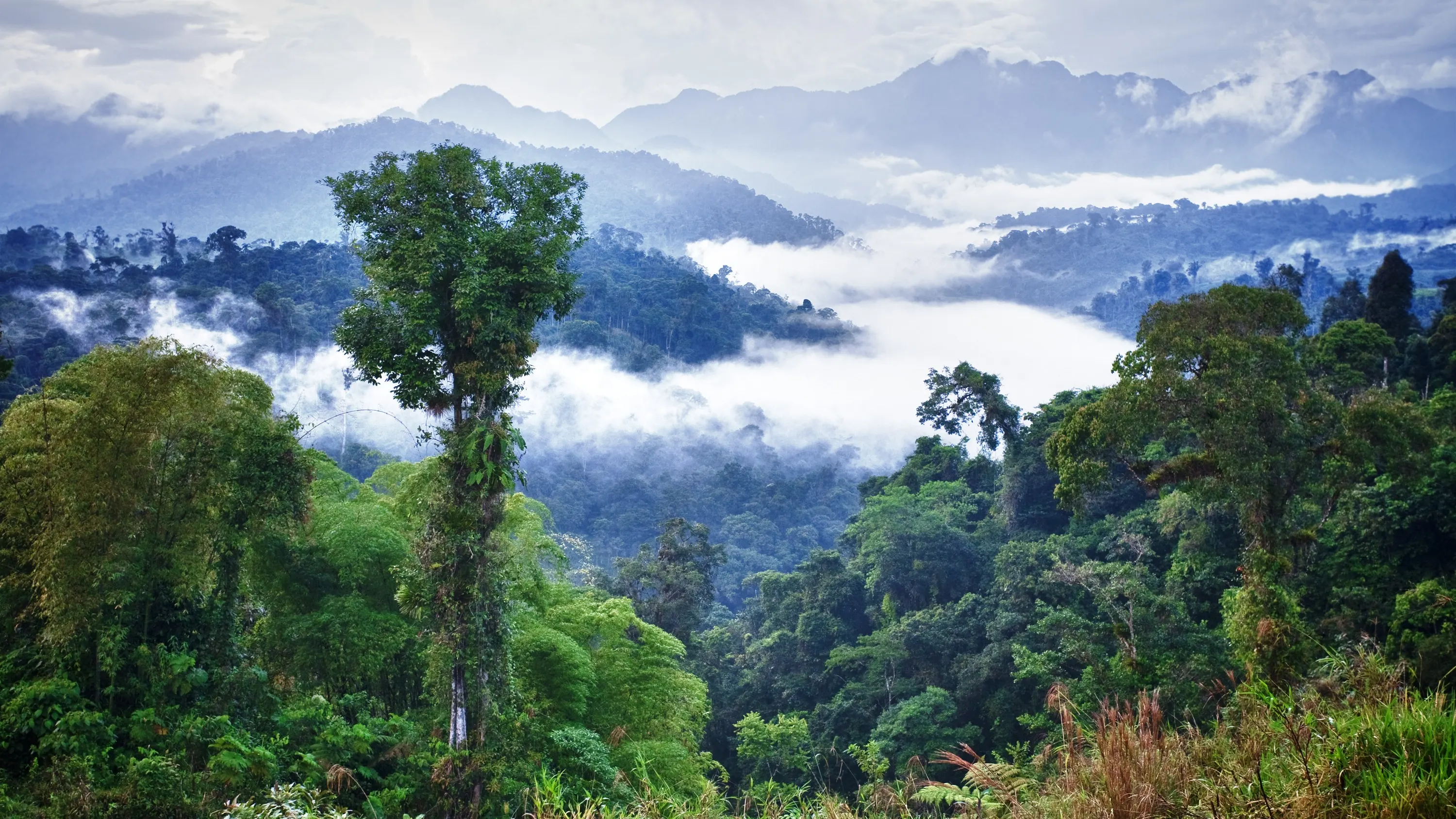
I consider myself fit and can easily log 10 miles on a hike. But when I first got to Ecuador, I was shocked when climbing the stairs in my house to the bedroom because it felt like scaling Mount Everest. The high altitude takes some time to adjust to, so don’t panic when you feel like you’re low energy or have trouble climbing hills. I don’t suggest chewing on the hojas de cocaína (cocaine leaves sold on street corners). Eat a bunch and you’ll find yourself speaking in tongues and your heart racing. Just remember it takes time to adjust to living at 8,000 feet, especially for me, a Floridian, where the highest mountain topped 14 feet. Give yourself time.
9. Making Change
The ATMs here only give out $20 bills and learning to get change is imperative. Banks are hesitant to give you change, but they are your best option of getting smaller denominations.
If you go to a tienda and buy some fruit and only have a twenty, they’ll look as if to say, “Do I look like a bank?” You need to secure change at banks or at change machines at the malls. Taxis are also not change machines and giving drivers a $10 for a $2.50 ride is likely to get you a firm “no”.
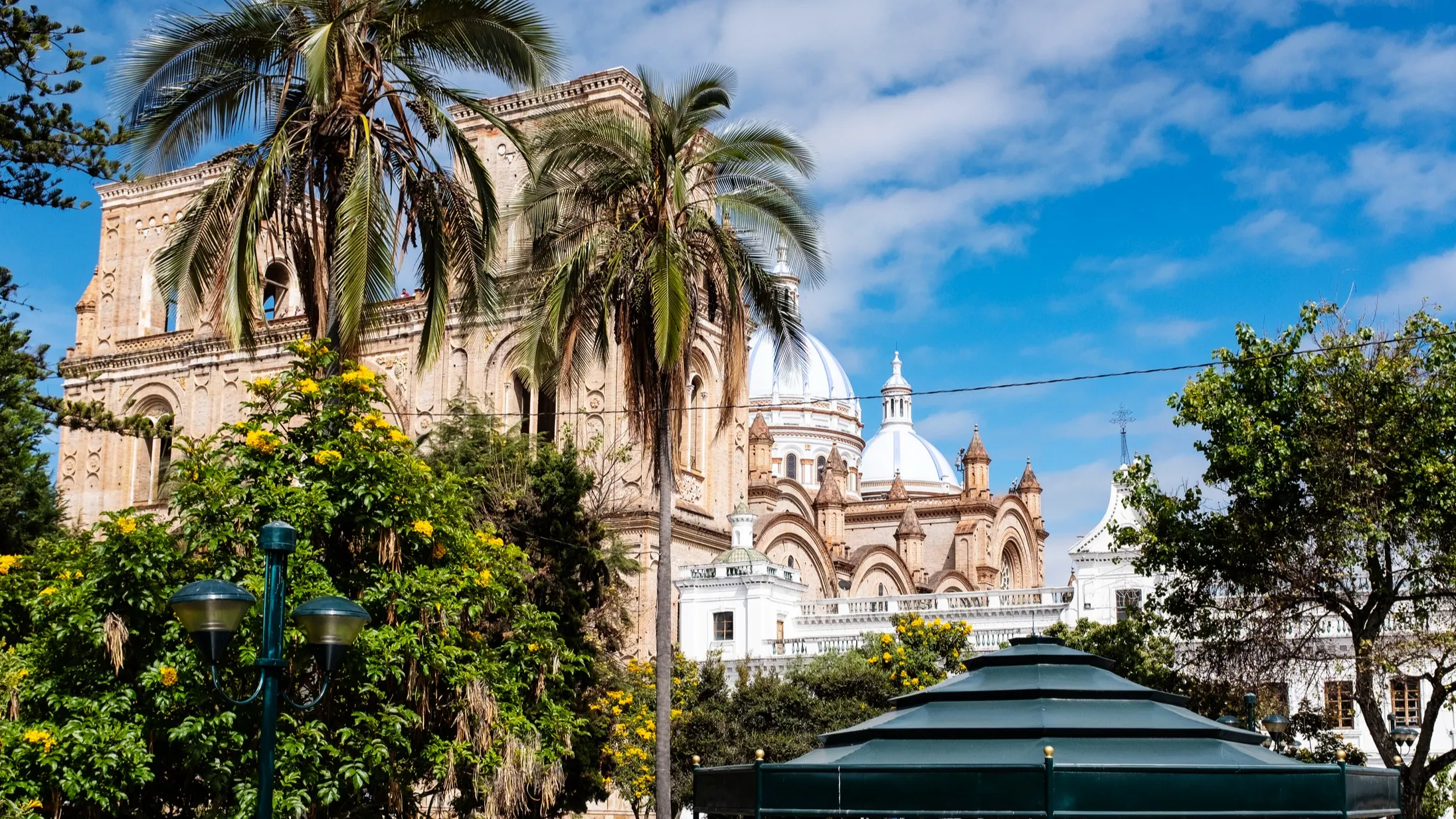
I get change in bigger tiendas which tend to have more change by breaking a $20 to buy inexpensive items (packs of gum and a few candy bars). Then I use the $10 to buy a kilo of cherries for $3 from street vendors who usually have some change.
10. Settling In
As realtors say, “It’s Location. Location. Location.” It’s true in Ecuador as well. Cuenca has a diverse array of neighborhoods.
Gringolandia is for expats wanting to live in two bedroom, two-bathroom condos in a U.S. enclave. El Centro is the downtown historic district for those wanting to be close to bustling restaurants, bars, and shopping. El Vergel and the Remigio Crespo areas are in uptown, accommodating several Universities and chic outdoor eateries.
There are many suburbs outside of the city center in Ecuadorian neighborhoods where rentals are lower and with prolific public transportation the distance need not be a concern. Wherever you pick, rent first. It takes time to learn the town and what neighborhood is your best fit.
11. Television Watching
Sometimes I prefer to watch television than leisurely stroll about town, shameful as that sounds. I get all the accoutrements of television watching in Ecuador. Hulu for reruns of my favorite shows like The Bachelor, Handmaid’s Tale or Castle Rock stories. Netflix for exceptional original programming like The Queen’s Gambit or Stranger things. On Amazon’s prime video I watch my favorites like Dexter or The Marvelous Mrs. Maisel. Then of course, there’s cable television or DirectTV so you get network addictions like CNN and Jeopardy!, or football. You will be able to get all your binge-watching favorites.
12. Culture
The people in Ecuador are extraordinarily kind. The mestizos (Spanish/indigenous Ecuadorians) are prolific cheek kissers and huggers. Teenage girls walk hand in hand down streets. Babies are strapped to their mother’s backs in long shawls and don’t cry. The indigenous are easy to spot because they wear their tribal clothes, but they are very shy and don’t want their pictures taken unless asked. And don’t go in for the kiss with indigenous, you are not their people.
13. Language Lessons
Although Spanish is the predominant language, you can usually find someone nearby who can help with translation. The President required English be taught in the schools, as travel has boomed here—more than 30% over the past five years—and it’s imperative the country catches up with being bilingual as Ecuador is now a popular tourist destination.
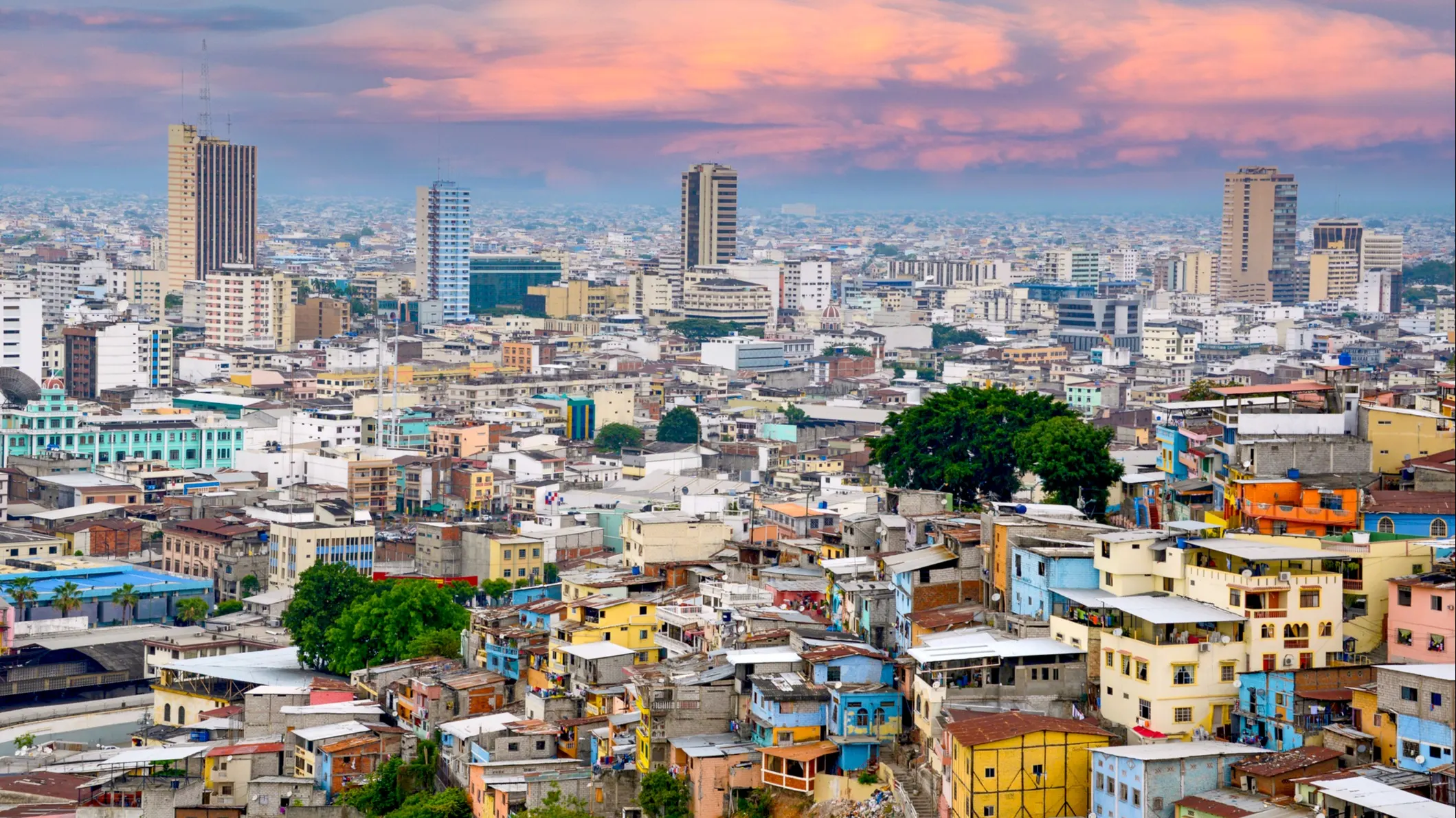
Please don’t yell your made-up Spanish words by adding o’s onto everything. Spanish is a spoken language, not a shouted language. Remember, it’s not your country so don’t expect everyone to speak English.
14. Safety First
Don’t flash your opulence in any way. Waving fancy jewelry and flashing designer bags may be like throwing chum at sharks. Same goes for getting money out of an ATM and counting it out. I’ve never once had a problem, but phones are fair game in Ecuador. The police do not pursue vandalism that is under $500, and many expats lose phones in taxis while fumbling for change, or by leaving them unmanned in restaurants.
Most of us don’t blend. My blonde hair and fair Irish skin makes me stand out in a crowd. Again, I’ve never had a problem, but it’s common sense anywhere these days to take precautions. If you go out at night, take a taxi. Cuenca is safe, but use common sense.
15. Bugging Out
Okay, no one likes to talk about this, but traveling abroad to developing countries can come with a free gift of parasites. Those barrelful of strawberries, cherries, and grapes are great to eat, but take them home and wash them in vinegar for 15 minutes. Fried street fare is fine, so grab empanadas or churros (fried donut sticks) without fear. Everyone, and I mean everyone—indigenous, mestizos, expats—follows this simple rule to void parasites: Every six months grab a Pazidol pack from the pharmacy (no prescription needed and costs around $3), which cleanses you of parasites and keeps them at bay.
16. Finding Friends
Cuenca has a large expat population and making friends is easy. Go on Gringopost.com and you’ll find all kinds of activities to meet kindred spirits. There are photography clubs, hiking clubs, poker or canasta games, foodie events, symphony concerts, English-speaking churches, etc. You can make Ecuadorian friends, maybe it’s your maid, or neighbors, through doing volunteer work or with vendors who’ve helped you get settled. It’s good to have a mix of both expats and locals as we are strangers living in a strange land.
Once you learn the culture and understand some Spanish, your life will get easier. And soon the notes stuck on closed stores while parents watch their children play will seem like a small price to pay for living in such a tranquillo culture where priorities are people and not material things.
Get Your Free Ecuador Report Here
Get Your Free Ecuador Report Here
Learn more about Ecuador and other countries in our daily postcard e-letter. Simply enter your email address below and we'll send you a FREE REPORT - Ecuador: Live Like Royalty on Your Social Security.

By submitting your email address, you will receive a free subscription to IL Postcards and special offers from International Living and our affiliates. You can unsubscribe at any time, and we encourage you to read more about our Privacy Policy.
